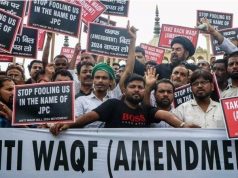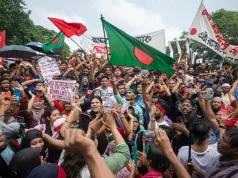A police encounter that happened in a secluded area on the outskirts of the city led to the untimely deaths of Asad and Ghulam. The incident arose debate and concern in the neighborhood, which resulted in demonstrations and calls for an investigation. The police report states that while on routine patrol, a group of officers learned of the presence of two suspects who were sought after for their involvement in several local crimes. Based on the tip, the police took action and found Asad and Ghulam in a remote area where they were reportedly hiding.
The police claim that they retaliated when the suspects allegedly opened fire when they saw the policemen. Asad and Ghulam were both shot dead in the subsequent gunfight. The two suspects, according to the police, were dangerous and highly armed, and the incident was brought on by their resistance to being taken into custody. The event stirred debate and called into question the legality of police encounters across the nation. Critics contended that such occurrences violated human rights and that suspects should be captured legally rather than executed without further trial.
The questionable circumstances surrounding the occurrence were also brought up by the relatives of the dead. They rejected the police version of what happened and asserted that their loved ones were innocent and had been singled out by the police without justification. The families urged that an impartial investigation be conducted into the tragedy and that their dear ones receive justice.
Protests and requests for accountability were sparked by the controversy surrounding the occurrence. In requesting an impartial investigation into the tragedy, civil society organizations and human rights organizations joined the families of the deceased. They demanded that the incident’s circumstances be thoroughly and objectively investigated and that those responsible be made to answer for their actions.
In response to the issue, the government mandated an investigation into the occurrence. An impartial commission was tasked with investigating to look at the incident and determine whether the police had behaved legally. The commission’s report1 concluded that the suspects’ human rights had been infringed and that the police had acted improperly. According to the report, the incident had been manufactured and the police had created false evidence to back up their version of what had happened.
The police were also criticized in the report for their incompetence and disregard for due process. It suggested holding the involved police officers accountable for their acts and taking measures to stop such instances from happening in the future. The report of the commission was welcomed by the departed’s relatives, who urged action on its suggestions. They voiced the wish that those accountable for the deaths of their loved ones would be brought to justice.
The incident2 was a harsh reminder of the need for police enforcement to be transparent and accountable. It emphasized the significance of respecting human rights and making sure that suspects are captured through legitimate channels as opposed to extrajudicial ones. The incident also highlighted the significance of unbiased investigations and the requirement for them in the pursuit of justice.
Criminal Charges Against Asad
Before his untimely passing during the police confrontation, Asad had a history of criminal involvement and multiple charges brought against him. These included armed robbery, drug trafficking, theft, assault, and extortion. However, it’s important to note that Asad was still innocent of all charges when he died during a police confrontation. Asad’s family and supporters believed that he was being set up and that the allegations against him were false. The police maintained that Asad was a known felon and posed a threat to public safety. They were aggressively pursuing him about the crimes he was accused of, and the encounter that resulted in his death occurred due to his resistance to being taken into custody.
The controversy surrounding Asad’s cases raised concerns about the Impartiality of the legal system, the requirement for a thorough and unbiased inquiry into the charges against him, and the importance of respecting the fundamental principles of the rule of law. The passage stresses the need for transparency, accountability, and justice in the administration of justice, as demanded by victims’ families, human rights organizations, and civil society organizations. Ultimately, Asad’s death highlights the significance of upholding the rule of law and ensuring that justice is served fairly and impartially.
An End to Rule of Law
Asad’s experience brings up several issues regarding the values of justice and the rule of law. In India, an armed encounter involving police officers and suspect criminals is called an encounter. These encounters have increased in frequency over the past few years, and some police officers have turned to extrajudicial executions rather than using the established legal processes for apprehending and prosecuting suspects. The idea that someone is innocent unless they are proven guilty is one of the fundamental tenets of justice. One of the cornerstones of the rule of law is this idea, which is inscribed in the Indian Constitution. Asad’s case is unclear because the authorities haven’t offered any proof that he committed any crimes, making it impossible to determine whether he was guilty of anything. The police have a responsibility to safeguard civilians and uphold law and order, but this responsibility must be fulfilled within the bounds of the law. Extrajudicial executions not only transgress the notion of justice but also challenge the legitimacy of the judicial system and the rule of law. When the police decide to kill criminals without completing the proper procedures, they set a bad precedent that could result in abuse of authority and the collapse of the legal system.
Additionally, encounters of the minority, marginalized populations, and lower socioeconomic groups frequently take place, giving rise to claims of police bias and discrimination. This further damages the public’s trust in law enforcement and calls into question the fairness of the legal system.
Moreover, encounters make it challenging to determine the reality of what transpired. The police frequently claim that interactions were justified acts of self-defense, although there are frequently questions about the truth of these statements. When the police are the only source of information and there is no independent investigation, it is hard to determine whether the encounter was lawful or the death was committed extrajudicially.
The right to a fair trial and due process Is also violated during Encounter. The fundamental right to life and liberty is violated when suspects are killed without being given the chance to defend themselves in court. Both the Indian Constitution and global human rights norms have been flagrantly violated by this.
After only a few days after Asad’s encounter, Atiq, his father and a former member of parliament, was shot and killed on April 15, 2023, as he was en route to a court-ordered medical examination. He had a contentious past and belonged to the Samajwadi Party, and had previously served in the Uttar Pradesh Legislative Assembly and the Indian Parliament.
The level of security Ahmed received while in police custody has come under scrutiny in the wake of Ahmed’s murder. According to certain stories, he may have received several death threats, but despite this, he didn’t receive enough protection. Although the Uttar Pradesh Police had earlier claimed to have given him heavy security, it is still unknown whether the security measures were sufficient to stop such an attempt.
Immediately after his murder, the incident was roundly condemned. In response to Ahmed’s murder, numerous lawmakers and members of the public voiced shock and mourning. In addition to denouncing the attack, the Samajwadi Party urged a thorough probe into what happened.
Ahmed’s murder is being looked into right now. The Uttar Pradesh Police created a Special Investigation Team (SIT) to investigate the case. It has reportedly made a number of arrests in connection with the crime
In conclusion, encounters like the one involving Asad violate the rule of law and the notion of justice. Police officers have an obligation to uphold the law and protect citizens, but they must do so within the parameters of the law. Extrajudicial executions undermine the legal system’s credibility while also violating citizens’ fundamental rights. It is critical that the government take action to ensure that interactions are investigated and that police officers responsible for extrajudicial executions are held accountable. Only then will justice be vindicated and the rule of law restored.
References
- https://indianexpress.com/article/explained/atiq-ahmads-son-asad-killed-what-sc-said-on-encounters-8554653/
- https://www.newsclick.in/no-helmet-bike-without-chassis-dilapidated-road-questions-galore-following-encounter-asad-and
The author is a law student at Aligarh Muslim University.






